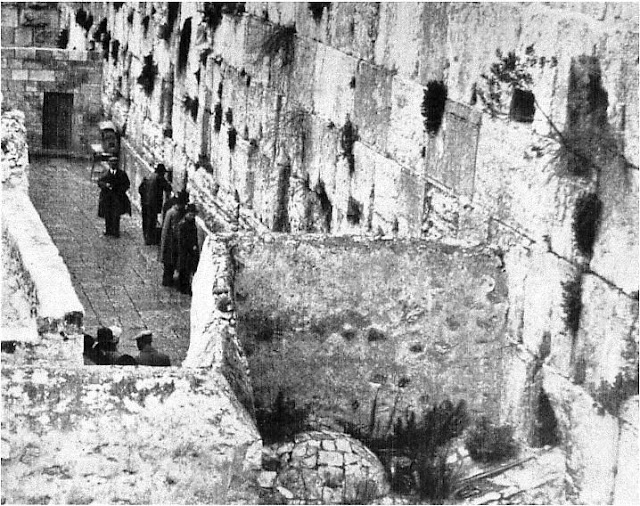 |
| Kotel, circa 1920 |
While US and European leaders have fallen over themselves to condemn Bezalel Smotrich for saying that the Palestinian people are a recent invention, saying that statements like that are inflammatory, there is silence in both diplomatic circles and the media about the Arabs denying any rights of Jews to the very place that they have prayed towards for thousands of years.
Selective outrage is the norm, of course. Arabs are expected to say inflammatory, inciting and false statements - they do this every day - but only Jews are expected to speak in measured tones and not to plainly state the truth if it might upset the touchy Arabs.
But there is a very interesting angle to the newfound Palestinian love of the 1930 Western Wall Commission report. (They made it clear at the time that they do not accept that the Commission has any legal right to rule on the issue.)
If you look closer at the specific Muslim claims in 1930 quoted in the Commission report, you find out that according to their logic at the time, Israel is the legal owner today not only of the Kotel but of all of Jerusalem.
The Muslim side, represented by Ahmed Zaki Pasha, declared the Muslim legal case to the Commission:
History shows that after having acquired Palestine by the right of conquest, the Jews were definitely driven out of the country by the Romans after the destruction of Jerusalem by Titus. The Christians then ruled the country until the Arab conquest under Omar. With the exception of 90 years during the epoch of the Crusades the effective possession of the country has been in the hands of the Arabs from generation to generation. The Jews who came to Palestine were not interfered with by the Arabs and were fairly well treated by the Moslem rulers of the country. During this long period there were no incidents at the Buraq. The Jews never claimed any rights to the Wall and were content to go now and them to lament at that place, contented in the assurance that the tolerant Arabs would not interfere with them. It is the Balfour Declaration, reiterated in the Terms of the Mandate, that has been the cause of the discussion which finally brought bloodshed over Palestine and incited the Jews to urge claims which they had never thought of before. The creation of a Jewish national home in Palestine, an Arab country, lost for ever by the Jews hundreds and hundreds of years ago, can only give rise to perpetual troubles and dissensions. The country which the Jews had taken over by right of conquest was again lost, and the Arabs in their turn conquered it, not from the Jews, who had been driven out of Palestine several centuries before, but from the Byzantines. It was not a Jewish kingdom that the Arabs occupied in the 7th century, but a country to which the Jews had no right whatever.
It is here a question about property which has belonged to the Moslems for many centuries.
The Arab side is saying explicitly that the way that land in Palestine changes legal ownership is by the right of conquest. They admit that Jews owned the land before any Arabs did, legally, by conquering it. Then the Romans, Byzantines and finally Muslims had legal ownership because of their subsequent conquests. And even the Muslim ownership of the Temple Mount and Western Wall had only been for "many centuries" because of the Muslim conquest of the land.
Since then, of course, the Jews re-conquered the land of Israel. And therefore, according to the Muslim's own testimony to this commission that they now say has legal weight, Jews have complete ownership of all of Jerusalem today, having conquered the city in 1967.
This is not the only part of the Muslim claims from 1930 that undermine their claim today.
One is that the 1930 claims admitted that the original holiness of the Temple Mount came from the Temples themselves, which today's Palestinian deny ever existed:
It ought to be observed that when Mohammed came to Jerusalem, the site of the ancient Temple, which was already an object of veneration for the Moslems, was called Masdjed Al Aqsa (i.e., remote oratory) in contrast to the Mosque of Mecca or Masdjed Al Haram (i.e., oratory, sanctuary). At that time Mecca was hostile to Mohammed. Owing to that, Jerusalem and especially the Temple area, for a certain period, became the first Kibla (direction) for the Moslems, i.e., during that period they turned their faces in the direction of Jerusalem when praying and it was not till later on that Mecca became definitely the Kibla.
Another most interesting section notes that according to Sharia law, once land is declared sacred Waqf land, it cannot lose that status - except for one case:
A Waqf property cannot be acquired by usucaption unless the usucaptor has enjoyed a peaceful and uninterrupted possession ab antique, i.e., for at least 33 years.
Israel has certainly had unquestioned possession of the Kotel since 1967, and arguably all of Jerusalem. (This is probably a very weak argument under Sharia; I imagine any dispute by the previous owner would make usucaption invalid, but it is a fun argument.)
Perhaps the Palestinians shouldn't be so quick to embrace the 1930 international commission report. It shows that the same Muslim legal reasonings that sounded good to them in 1930 can now be used against them.


